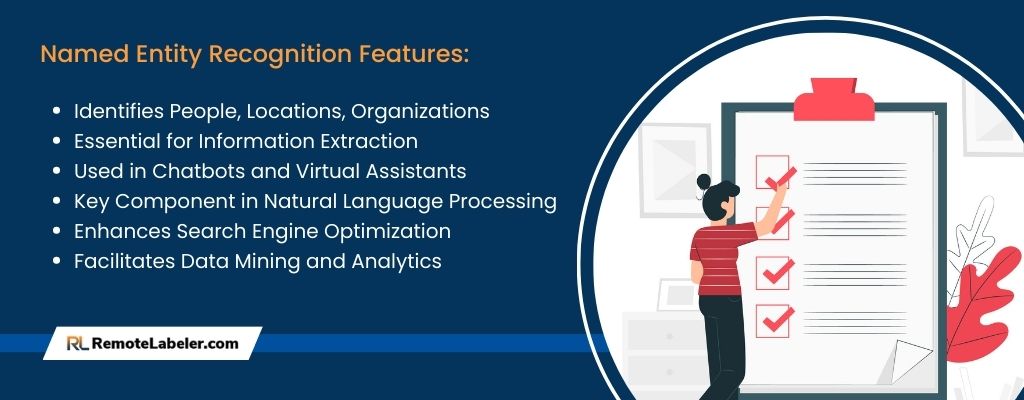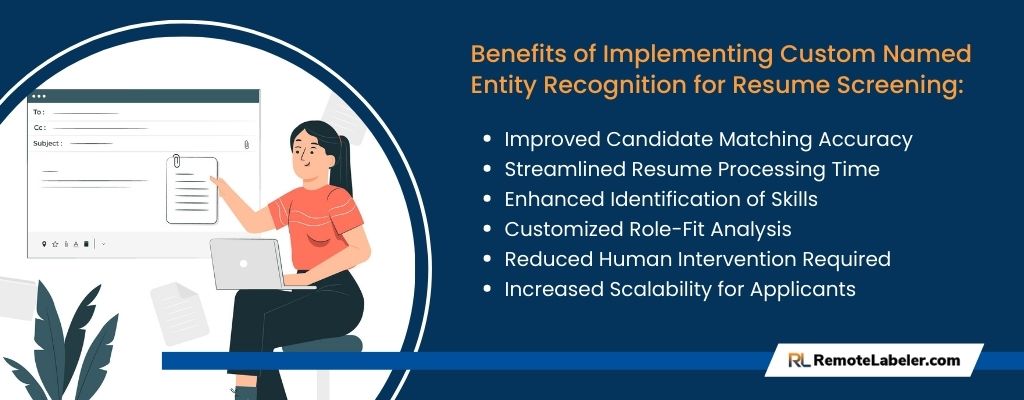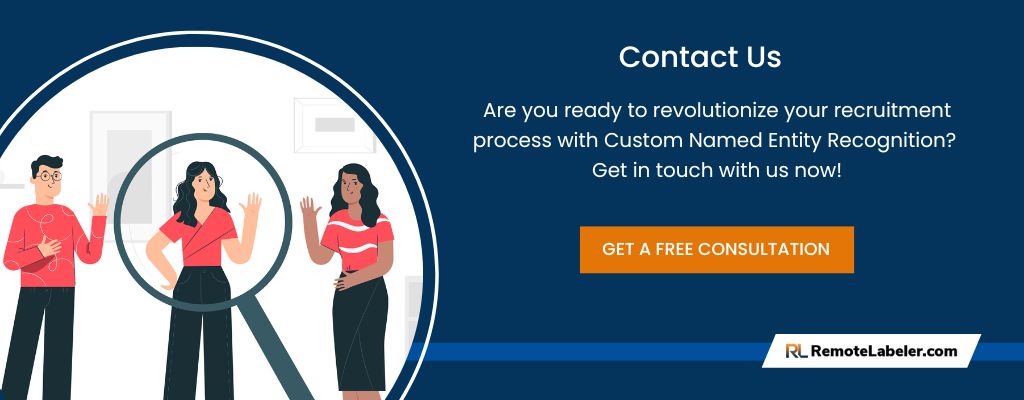In the fast-paced world of recruitment, time is of the essence for talent acquisition specialists. With an ever-increasing pool of applicants vying for limited positions, the process of resume screening can be an overwhelming task for recruiters. The sheer volume of resumes inundating their desks necessitates efficient and intelligent automation to streamline the hiring process. This is where the power of Named Entity Recognition (NER) comes into play as a crucial Natural Language Processing (NLP) technique, offering a viable solution to the challenges faced by recruiters.
According to recent statistics, outsource data labeling has emerged as a pivotal trend, with a significant number of companies turning to expert external providers to handle the laborious task of data annotation and labeling. The need for precise and contextually-aware data labeling is particularly evident in the context of resume screening, where identifying and categorizing crucial information from diverse resumes is essential for recruiters to make informed decisions.
Understanding Named Entity Recognition (NER)

Named Entity Recognition (NER) is a fascinating subfield of Natural Language Processing (NLP) that has garnered significant attention in recent years. Its primary objective is to automatically identify and classify entities within a text, transforming unstructured data into structured, actionable information. These entities can encompass a wide range of categories, including but not limited to:
Person Names: NER systems excel at recognizing the names of individuals, irrespective of their cultural backgrounds or complexities, making them an invaluable tool for various applications like social media monitoring, personalized content delivery, and customer relationship management.
Organizations and Institutions: With the capacity to discern organizations, companies, and institutions from text, NER facilitates tasks like competitor analysis, reputation management, and identifying key players in specific industries.
Locations: NER aids in pinpointing geographical locations, be it cities, countries, landmarks, or any other site, crucial for applications such as location-based services, travel recommendations, and disaster management.
Temporal Expressions: NER proficiently handles date and time expressions, playing a pivotal role in scheduling, event planning, historical data analysis, and news sentiment tracking.
The core strength of NER lies in its ability to understand the context of words, ensuring that entities are recognized accurately, even in complex sentences or ambiguous contexts. Achieving this precision requires robust machine learning and deep learning techniques, which involve training NER models on extensive labeled datasets.
Custom Named Entity Recognition and Intelligent Resume Screening
As the demand for skilled talent continues to grow, organizations are actively seeking ways to optimize their recruitment processes and identify the most qualified candidates efficiently. Custom Named Entity Recognition (NER) emerges as a game-changing solution in the realm of intelligent resume screening. By leveraging 3D point cloud annotation services and tailoring NER models to domain-specific datasets, companies can unlock a wealth of benefits and transform their candidate selection process. Let’s delve deeper into the world of Custom Named Entity Recognition and its profound impact on intelligent resume screening.

1. Tailoring NER for Specific Domains
Standard NER models, while effective in general applications, may fall short in capturing the nuances and domain-specific terminologies that are prevalent in industries like healthcare, finance, or technology. Custom Named Entity Recognition involves the creation and fine-tuning of NER models using labeled data that precisely represents the language and entities pertinent to a particular industry or job role.
For instance, in the medical field, medical named entity recognition (NER) plays a crucial role in identifying and classifying entities like medical conditions, treatments, drugs, and symptoms from clinical texts. By leveraging domain-specific labeled datasets, NER models can achieve exceptional accuracy in recognizing specialized medical terminologies, enabling healthcare organizations to streamline patient care and medical research.
2. Reducing False Positives and Negatives
Standard NER models are trained on diverse data, making them susceptible to producing false positives (identifying non-entity words as entities) and false negatives (failing to recognize entities). Such inaccuracies can lead to flawed resume screening results and may result in the oversight of potential top candidates.
Custom Named Entity Recognition addresses these issues by training models on high-quality datasets that are specific to the organization’s requirements. By fine-tuning the models to the unique characteristics of the industry and job roles, custom NER significantly reduces false positives and negatives, ensuring that the screening process is more reliable and precise.
3. Enhancing Entity Classification and Context Understanding
In intelligent resume screening, it is essential not only to recognize entities but also to understand their context and roles within the resume. Custom Named Entity Recognition enables models to comprehend the relationships between entities, their relevance to the job description, and the overall context of the candidate’s experience and qualifications.
For example, in the IT industry, custom NER models can identify and categorize various technical skills and certifications held by candidates. Moreover, these models can differentiate between primary skills and secondary skills, providing recruiters with a comprehensive overview of each candidate’s expertise, ensuring a more accurate match with the job requirements.
By enhancing entity classification and context understanding, custom NER empowers recruiters with actionable insights, enabling them to make data-driven decisions and select candidates who best fit the organization’s needs.
4. Seamless Integration with Applicant Tracking Systems (ATS)
A significant advantage of custom NER is its adaptability to integrate seamlessly with existing Applicant Tracking Systems (ATS). ATS platforms play a vital role in managing the recruitment workflow, and by incorporating custom NER capabilities, recruiters can automate the extraction of essential information from resumes and organize it efficiently.
The integration of custom NER with ATS not only saves time and effort but also ensures a more standardized and structured approach to resume screening. This streamlining of processes allows recruiters to focus on engaging with candidates, conducting interviews, and assessing cultural fit, elevating the overall candidate experience and fostering a positive employer brand.
Benefits of Implementing Custom Named Entity Recognition
Custom Named Entity Recognition (NER) emerges as a game-changer in the world of intelligent resume screening, offering a host of advantages over generic off-the-shelf NER solutions. By training NER models on domain-specific datasets, finely tuned to the intricacies of particular industries and job roles, companies can unlock a plethora of benefits that go beyond conventional resume parsing techniques.
When implementing Custom Named Entity Recognition for intelligent resume screening, businesses can expect the following advantages:
- Enhanced Precision: One of the primary benefits of custom NER lies in its ability to achieve higher precision and accuracy in extracting relevant information from resumes. Tailored to recognize industry-specific entities and terminologies, custom NER models can precisely identify skills, certifications, and educational qualifications, ensuring the most qualified candidates are identified for further evaluation.
- Time Efficiency: Automating the resume screening process through custom NER significantly reduces the time and effort invested by recruiters. By swiftly extracting and categorizing key information, custom NER streamlines the candidate selection process, allowing recruiters to focus on strategic decision-making and personal interactions with shortlisted candidates.
- Bias Mitigation: Custom NER models rely on data-driven insights rather than human judgment, mitigating unconscious biases that may creep into the recruitment process. By treating all candidates objectively, regardless of their background, custom NER fosters a fair and equitable hiring environment, contributing to diversity and inclusion initiatives within the organization.
- Scalability: Custom NER solutions offer scalability to meet the demands of businesses of all sizes. Whether it’s a startup handling a modest number of applications or an enterprise processing thousands of resumes, custom NER can efficiently handle the ever-growing volume of candidate data without compromising on performance.

Implementing custom NER for intelligent resume screening is more than just a technological upgrade; it represents a shift towards a more data-driven and efficient recruitment process. Companies that adopt custom NER gain a competitive edge in their talent acquisition efforts, ultimately leading to improved hiring outcomes and enhanced candidate experiences.
The benefits of custom NER extend beyond the immediate advantages listed above. Companies that harness the power of domain-specific NER gain a deeper understanding of their talent pool, enabling them to make informed workforce planning decisions and anticipate skills gaps within the organization. Moreover, the data collected through custom NER can be analyzed to identify emerging trends in the job market, enabling organizations to stay ahead of the competition and attract top talent in competitive industries.
Furthermore, the implementation of custom NER paves the way for seamless integration with other HR technologies, such as applicant tracking systems (ATS) and candidate relationship management (CRM) tools. The synergy between custom NER and these systems creates a holistic recruitment ecosystem, where candidate data is efficiently managed and leveraged to drive strategic decision-making.
Conclusion
Named Entity Recognition (NER) stands as a transformative force in the realm of intelligent resume screening. Its ability to automatically identify and categorize entities within unstructured text data has revolutionized the way companies approach talent acquisition. NER’s proficiency in recognizing crucial details such as candidate names, educational institutions, work experience, and technical skills streamlines the recruitment process, saving valuable time and resources.
At Remote Labeler, we are committed to delivering state-of-the-art NLP solutions, empowering your organization to unlock the full potential of resume data. Embrace the future of recruitment by leveraging our expertise in custom NER, and witness the impact of streamlined, efficient, and bias-free candidate selection. Don’t miss out on the opportunity to revolutionize your recruitment process.
Contact us today to hire Remote Labeler annotation experts and elevate your talent acquisition strategy to new heights.
- Emerging Trends and Future Outlook: The Data Labeling Industry in 2024-2030 - December 8, 2023
- Landmark Annotation: Key Points - November 6, 2023
- All You Should Know About Bounding Box Annotation - November 5, 2023